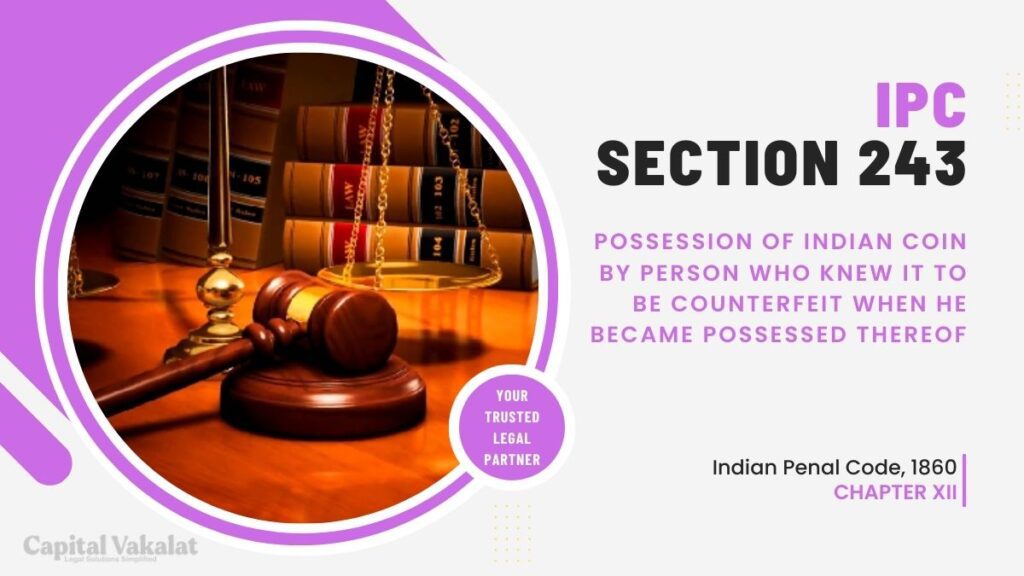In this comprehensive article, we will delve into the nuances of Section 243 of the Indian Penal Code (IPC), which deals with the possession of Indian coins by individuals who were aware of their counterfeit nature when they acquired them. This legal provision is a vital component of the Indian criminal justice system, aiming to address issues related to counterfeit currency and the consequences faced by those who knowingly possess such coins.

We will explore the section in detail, examining its origins, its implications, and the broader context of counterfeit currency in India. Join us as we decipher Section 243 IPC and understand its significance in our legal framework.
Introduction to Section 243 IPC
Section 243 of the Indian Penal Code (IPC) is a critical legal provision that addresses the possession of Indian coins by individuals who knowingly acquired counterfeit currency. This section plays a pivotal role in maintaining the sanctity of the Indian financial system by penalizing those who engage in counterfeiting and those who possess counterfeit coins with the knowledge of their falsity.
Understanding Counterfeit Currency
Counterfeit currency poses a significant threat to any economy, including India’s. It refers to fake money created with the intent to deceive or defraud. The circulation of counterfeit currency can destabilize financial systems, leading to economic losses and affecting public trust in the currency.
Origins and Evolution of Section 243 IPC
Section 243 IPC has a historical backdrop. It was introduced as a legal provision during a time when counterfeit coins were a prevalent issue in the Indian subcontinent. The provision was added to deter individuals from knowingly using counterfeit currency.
Key Provisions of Section 243 IPC
Section 243 IPC primarily consists of two essential elements:
- Possession of counterfeit Indian coins.
- Knowledge of their counterfeit nature at the time of acquisition.
This section addresses the act of possessing counterfeit coins, focusing on the crucial element of ‘knowledge.’ It is not sufficient to establish possession alone; one must also prove the accused was aware of the counterfeit nature of the coins at the time of acquisition.
Punishments and Penalties
Individuals found guilty under Section 243 IPC face legal consequences. The severity of these penalties varies depending on the specific circumstances of the case. The intention behind these penalties is to deter individuals from engaging in activities related to counterfeit currency and to uphold the integrity of the financial system.
Prosecution and Legal Proceedings
When a person is accused of violating Section 243 IPC, the legal process begins. The prosecution must prove the accused’s possession of counterfeit Indian coins and establish their knowledge of the counterfeit nature at the time of possession. This process involves gathering evidence, presenting witnesses, and ensuring a fair trial.
Challenges in Enforcing Section 243 IPC
Enforcing Section 243 IPC is not without its challenges. Counterfeit currency operations can be complex and sophisticated, making it difficult to trace the source. Additionally, proving knowledge at the time of possession can be legally intricate.
Landmark Cases
Throughout the years, several landmark cases have shaped the application of Section 243 IPC. These cases have played a pivotal role in setting legal precedents and ensuring the effective enforcement of this provision.
Relevance in the Modern World
In today’s digital age, counterfeit currency has evolved beyond physical coins to include digital forms. We will explore how Section 243 IPC is adapted to address modern challenges and the evolving nature of counterfeit currency.
Conclusion
Section 243 IPC is a crucial tool in the fight against counterfeit currency in India. It upholds the integrity of the nation’s financial system and seeks to protect the interests of the general public. By understanding its provisions and implications, we can appreciate its significance in our legal framework.
Frequently Asked Questions
What is the significance of knowledge in this section?
Knowledge is a crucial element as it differentiates innocent possession from knowingly possessing counterfeit currency. To be convicted under Section 243 IPC, one must have been aware of the counterfeit nature at the time of acquisition.
Can Section 243 IPC address digital counterfeit currency?
Section 243 IPC has been adapted to address modern challenges, including digital counterfeit currency, thus keeping it relevant in the digital age.
What are the penalties for violating Section 243 IPC?
Penalties vary based on the circumstances of each case. They can range from fines to imprisonment, with the intention of deterring individuals from engaging in counterfeit currency activities.
How has landmark cases influenced the application of Section 243 IPC?
Landmark cases have played a significant role in shaping the legal interpretation and enforcement of Section 243 IPC, providing guidance for future cases and upholding the rule of law.